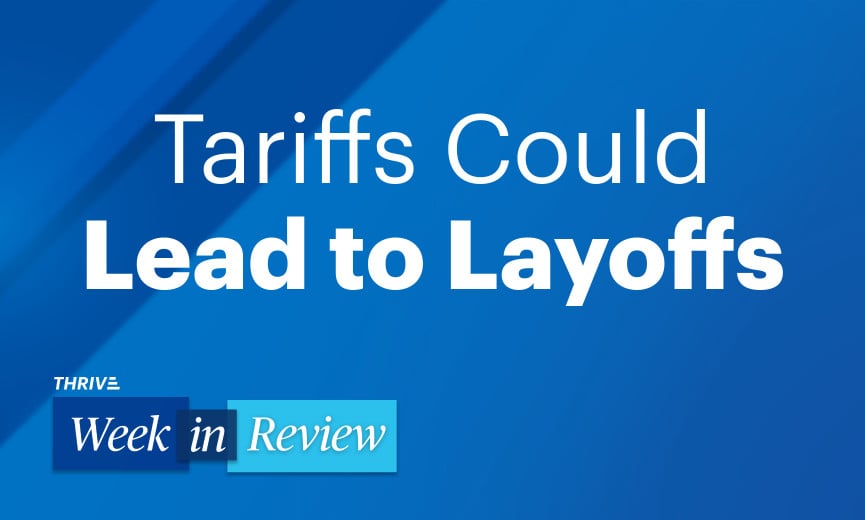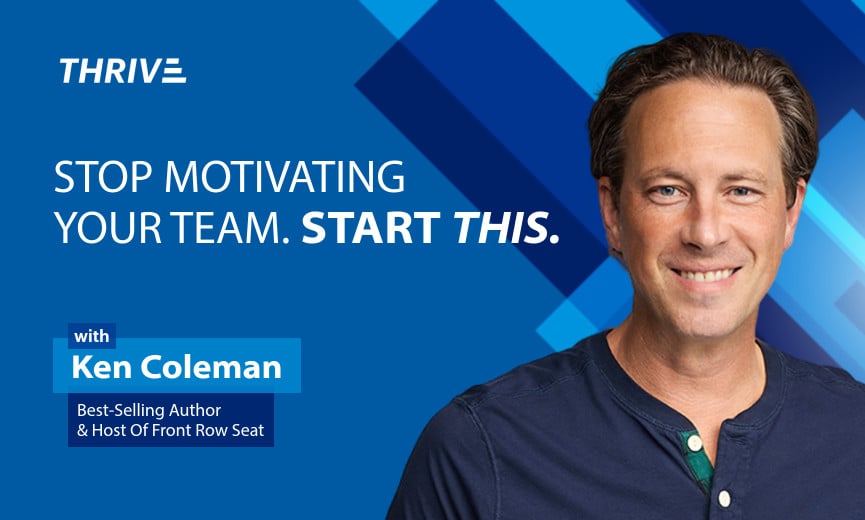- Thrive
-
Season
4Episode115
Enhance the Online Search Experience with the Right AI
Podcast •
Watch
Summary
Businesses looking to improve the online customer experience should listen to what Algolia has been doing. Chief Technology Officer Sean Mullaney chats with host Gene Marks on the Paychex THRIVE podcast about how the company is using AI-powered tools to enhance searchability, whether that is for products or content. Algolia has worked with businesses trying to build and enhance the digital experience and now powers search in more than 18,000 websites. Mullaney says the goal is to make search functionality simple while also pushing a more personal assistant-type experience for those searching the web. Learn how this AI-powered technology can help even the smallest businesses compete.
Topics Include:
00:00 – Welcome, Sean Mullaney
00:42 – Introduction to Sean Mullaney
01:29 – What does Algolia do?
03:36 – How e-commerce benefits from Algolia’s efforts
05:45 – AI and its use in enhancing searchability
10:11 – Bringing personal assistant-type experience to the web
13:50 – Leveraging technology, staying nimble can benefit small businesses
14:49 – Wrap-up
View Transcript
Sean Mullaney (0:00:00 to 0:00:10)
I think what is about to happen is commerce is about to change a lot, and the folks that are able to leverage the newer technology are going to have an advantage.
Announcer (0:00:12 to 0:00:27)
Welcome to Paychex THRIVE, a Business Podcast, where you'll hear timely insights to help you navigate marketplace dynamics and propel your business forward. Here's your host, Gene Marks.
Gene Marks (00:00:27 to 00:00:55)
Hey, everybody, it's Gene Marks. And welcome back again to another episode of the Paychex THRIVE podcast. We're still talking about AI, and we plan on doing a lot more episodes on AI during this year because it really does impact all of us as business owners. Today, I've got Sean Mullaney on board. He is the chief technology officer at Algolia. It's www.Algolia.com. A-L-G-O-L-I-A. Sean, thank you very much for joining us.
Sean Mullaney (00:00:56 to 00:01:02)
Thank you so much for having me on the podcast. I'm a big fan.
Gene Marks (00:01:02 to 00:01:29)
This is, like I said before we even started recording, it's relatively short conversation. I mean, we're trying to educate our audience about different companies that are doing cool things with AI and technology that may or may not impact them. And hopefully, I think that Algolia does have a lot of impact on a lot of our listeners and viewers. So, let's just start from scratch. Tell us a little bit about the company and what you guys do and why you think it might be of interest to the people that we're talking to right now.
Sean Mullaney (00:01:29 to 00:02:00)
Yeah, well, thank you so much for having me on. So, Algolia is like one of the core pieces of infrastructure for the internet. So, we power search in over 18,000 websites across the internet. So, when you think about any type of digital experience, you've got to have some aspect where a customer can search for things in the app. And Algolia was started to make that really simple and easy to do for anyone who's building a digital experience. You know, if you want to build a search engine, it's actually a pretty complex thing to do.
Gene Marks (00:02:00)
Right.
Sean Mullaney (00:02:00 to 00:02:19)
When you go to Algolia, we provide all the tools for developers and for businesses to be able to add this kind of powerful search functionality in a really simple, easy to use way. Whether you're a developer or whether you've got a Shopify account, you can kind of have seven lines of code or a few clicks, and suddenly you have this incredible power of a hosted search engine behind you.
Gene Marks (00:02:19 to 00:02:40)
Okay, so first of all, when I hear search, obviously I think about Google and we know as layman that I can put in a URL of a website that a colon and then do a search. And theoretically, Google is doing a search on that site. So, tell us how Algolia differs from that approach.
Sean Mullaney (00:02:41 to 00:03:24)
Yeah, so we're not powering or indexing the whole of the world's information, but instead what we're trying to do is we're trying to help folks who are building great digital experiences for their businesses index and make the content that they're either selling or they're creating available to all of their users. So, when you think of we power a lot of e-commerce stores, we power a lot of newspapers and media organizations. And the more content you have, the more products you have, the more visitors you have, the more important it is that you get it right. Important that you choose a partner that's got a lot of scalability and really easy to use kind of interface for folks so that you don't have to figure out all the crazy hard things that are involved in building a search engine.
Gene Marks (00:03:24 to 00:03:35)
Got it. You mentioned about e-commerce and also about media. I mean, are those your two biggest sort of customer bases or do you find yourself selling elsewhere?
Sean Mullaney (00:03:36 to 00:04:30)
Yeah, we have really specific products for e-commerce companies. So, I actually think that's one of the areas where if you can improve the search and discoverability of your product catalog, you can demonstrate incredible value for companies in the e-commerce space. They can measure it, they can know. We used Algolia, we added these features. This is how much more revenue we made for the business.
So, e-com is definitely one of the areas that we excel at. But we're a pretty horizontal developer platform and we have all sorts of crazy businesses and ideas and things that people have built on top of us. So, in a lot of ways we have a kind of layer that's agnostic to any industry. We can put any type of content in motion. And we have like SaaS companies, we have tons of mobile apps and B2C companies. During the crypto boom, we had a lot of NFT marketplaces and things like this. So, we get all sorts of companies. But yeah, I'd say e-com is the place where we see the most value.
Gene Marks (00:04:30 to 00:04:43)
Got it. Would you say that most of your technology, this is licensed to your customers, then your customers themselves are developing their solutions on their own? Or do you guys provide any type of development or implementation services?
Sean Mullaney (00:04:45 to 00:05:30)
We do have some professional services for folks who have particularly complex integrations and we work with a lot of partners, so there'll be a lot of solutions, integrators. If you're a company that's looking to kind of partner to build a full digital experience, you'll probably want to engage one of these solutions integrators to help you. And so we work with a lot of those folks. But if you have a team of developers, we're really easy to get started. You can sign up online, get your keys, and be up and running. I think my first Algolia implementation took me about 10 minutes to get up and running. It was that quick. So, we also have just really simple plugins for Shopify and big commerce, and a lot of the big kind of e-commerce platforms for folks that don't have developers on their team.
Gene Marks (00:05:30 to 00:05:44)
Got it. There are other companies that do provide these types of search services, your competition. How do you stand apart when you're selling this to prospective clients? What makes you so different?
Sean Mullaney (00:05:45 to 00:07:20)
Well, the first thing is the kind of scale that we operate at is pretty incredible. So, if we were a public search engine, we would be the second-biggest search engine in the world, behind Google. So, we're about four times bigger than all the other non-Google search engines combined. We serve about 2 trillion requests a year, which equates to about one in six internet users every month. So, we really do operate at a scale and speed that you really need for a type of enterprise production system.
The second thing where we really differentiate is we really are an innovator in AI search. So, as a lot of people have seen with ChatGPT, AI in the last 12 months has had a huge kind of quantum leap forward in its ability to understand human language. And search is an area where understanding human language is really the essence of how you solve the problem. And so, needless to say, over the last few years, we've been investing very heavily into AI research and taking that research and scaling it out to our customers. And so, we now have an end-to-end AI product.
And the great thing is that all of our existing customers and new customers, they don't have to understand AI to be able to benefit from it. It's all behind the same API, it's behind the same integrations with Shopify as our original product. But we really do think that this kind of human understanding that AI has enabled over the last year is going to be a game changer, both in search but also in e-commerce and other digital.
Gene Marks (00:07:21 to 00:07:46)
I mean, do you consider, I don't know, OpenAI or Anthropic or any of the other sort of large language models that any company can, for the most part, can license and develop their own SEO capabilities their own AI capabilities internally. Are these competitors of yours, or do you feel that your products will work alongside of them?
Sean Mullaney (00:07:47 to 00:08:36)
Yeah, and I think there's a new kind of tech stack that's emerging, and the folks that you mentioned are people who are training what's called foundational language models. And so, they're the ones out buying all the crazy Nvidia chips and trying to invest tens and hundreds of millions of dollars to have a breakthrough in the foundational understanding of language. And then there are a lot of companies like ours that are taking those models and incorporating them into existing application. And in our case, we're taking these core language models and putting them and rebuilding the whole search stack around them. So, yeah, we're not competing with OpenAI or Anthropic or any of these folks to make the base models, but we really are building search from the ground up to leverage the capabilities.
Gene Marks (00:08:36 to 00:09:57)
Got it. Where do you see, Sean, the future of integrating different language models as well as databases together to provide full blown search? And I'll give an example. I was actually at a conference just two weeks ago. It was a manufacturing conference, and there was a lot of talk about AI, and there's data that's being brought in by forklifts on video that is just analyzing the safety, and there's machinery and equipment that's accumulating data, as well, about the efficiencies of running something through it.
And of course, there's the ERP systems and the purchase order systems and inventory management systems, the security systems. I guess there's a lot of data that is being stored all over the place. I feel like there's this need for a company like yours to be in the middle of all of that, to provide answers to users internally before they run a job, for example, or what would be the most productive way to do this, or finding a job that was similar to this job. Do you see Algolia going in that direction as a sort of company that brings together a bunch of data together and uses your search technology to provide answers, like a generative AI interface?
Sean Mullaney (00:09:57 to 00:10:11)
Yeah, absolutely. I think one of the things where we really excel is being able to take a lot of different content, be able to search through it simultaneously. So, you've mentioned a lot of different types of kind of sensor things like this.
Gene Marks (00:10:11)
Right.
Sean Mullaney (00:10:11 to 00:11:39)
So, lots of content search through it simultaneously, and then the output of that content we're actually running through generative AI models to be able to summarize, combine, and give you specific answers based on specific data. So, this is a new area. I'll give you a great example. In e-commerce, right. In the traditional world of retail, you could walk into a store and have a conversation with someone who is a domain expert on the products that were being sold in the store, and they would give you a personal assistant-type experience, helping you try on things, find things, give you advice.
When we move to the internet, we're not able to do that at scale. And instead, a lot of ecommerce sites often feel like they're a kind of warehouse with a website built on top of it. And so I'm very excited. A lot of the work that we're doing at the moment is how do we bring that kind of like personal assistance type experience to the web? And part of the ways that we're doing it is we're combining both the product search on the website, as well as a lot of the informational search that you can do in terms of different types of technologies.
And let's say you're buying TV, you want to understand the difference between an led or an OLED screen. You want to understand which brand is best for cinema or sports. You can actually get advice on specific domains using this type of generative AI. And I feel like the shopping experience is going to change a lot.
Gene Marks (00:11:39)
Yes.
Sean Mullaney (00:11:39 to 00:11:53)
It's not going to be clicking filters and scrolling through hundreds of pages of products to find the one that you want. It's going to be far more conversational and powered by AI-based search like the one Algolia provides.
Gene Marks (00:11:53 to 00:12:22)
There's a huge market out there for you, but one of the biggest players, obviously, is Amazon, and they did just buy Anthropic recently. Do you feel like that is the direction one of the leaders in e commerce that they are? That's what they're looking to do as well. Right. So, no longer am I searching for Cadbury's chocolates, but I'm actually having a conversation and asking for different types or what I enjoy most or what it goes with until it finds me that product. Is that what you're saying, where search is going?
Sean Mullaney (00:12:23 to 00:13:02)
Yeah. And one of the things that we're really proud of is that we want to make everyone's e-commerce store and everyone's business as good as Amazon's. And know Amazon and Google have a huge amount of firepower when it comes to data science and compute and resources and R&D, etc. And if you're trying to build your own e-commerce business, it can often feel like, how on earth can I compete with folks like that? Right?
And so one of the things I feel a lot of pride with is arming kind of the little guys or the smaller companies with the same type of technology that Amazon and Google have so that they can compete on the product and the price and the experience in a way that seems.
Gene Marks (00:13:04 to 00:13:49)
Again, and we'll wrap this up in a couple of minutes because it's really fascinating stuff. But I see this being used by our audience, the ones that are heavy into e-commerce. I see them, or that are generating a lot of content on their sites, which they need to have a search. I mentioned, you know, what Amazon's play is, but that's if you're an Amazon storefront. I mean, great, benefits them, but what if you've got your own sites you need your own alternative to. So, is my takeaway is that that's what Algolia means to, you know, is every bit as good as the best search engine or even generative AI tool. Eventually, that smaller and mid-sized companies can be using to power their sites. Is that a fair assessment?
Sean Mullaney (00:13:50 to 00:14:49)
Yeah, absolutely. I couldn't agree more. And I think what is about to happen is commerce is about to change a lot and the folks that are able to leverage the newer technology are going to have an advantage. And you regularly see when you have these big technology waves that it's some of the smaller companies that are more nimble, that are able to adapt quicker. And we want to empower a lot of the small, medium-sized businesses to adapt.
We also work with very large e-commerce companies, as well. But really I think the folks that get started quickly and adopt this technology early are going to have a great advantage. And to be know the Amazons of the world, it's going to take them a little while. They're a very big company and so they're like an oil tanker. It's going to take them a little time to move around. So, I do think that there's a great advantage at the moment, leveraging partners like Algolia to be able to experiment and innovate in these areas. It's great.
Gene Marks (00:14:49 to 00:15:13)
Sean Mullaney is the chief technology officer at Algolia at www.Algolia.com – A-L-G-O-L-I-A. Sean, great information. Thank you very much for spending the time. We'll continue to track the success of the company as a great tool for searching on one's website. I can only imagine the opportunities that you've got coming up with generative AI. So, thanks for spending the time.
Sean Mullaney (00:15:13 to 00:15:15)
Thank you so much for having me.
Gene Marks (00:15:15 to 00:15:39)
Do you have a topic or a guest you would like to hear on thrive, please let us know. Visit payx.me/thrivetopics and send us your ideas or matters of interest. Also, if your business is looking to simplify your HR, payroll, benefits, or insurance services, see how Paychex can help. Visit the Resource hub at paychex.com/worx. That's W-O-R-X.
Gene Marks (00:15:39 to 00:15:52)
Paychex can help manage those complexities while you focus on all the ways you want your business to thrive. I'm your host, Gene Marks, and thanks for joining us. Till next time, take care, you this.
Announcer (00:15:52 to 00:15:57)
Podcast is property of Paychex Incorporated, 2023. All rights reserved.

 Apple Podcast
Apple Podcast Spotify
Spotify iHeartRadio
iHeartRadio









